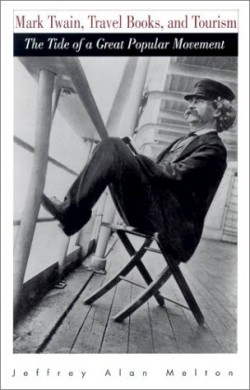Mark Twain, Travel Books, and Tourism
The Tide of a Great Popular Movement
Any backpacker who’s felt superior to the passengers filing off the tour bus in front of the Eiffel Tower, and every vacationer who has fretfully sought to experience the “real” culture of a foreign country from the comfort of a luxury hotel, will identify with the author’s observation: “everybody wants to travel, but nobody wants to be a tourist.” This is not a new phenomenon in America, Melton explains, but one that dates back more than a century, to when steamships first made recreational cross-Atlantic travel popular.
It was in this environment that Mark Twain became famous for his travel narratives. While generations of readers have loved Twain for his novels, in his own time the author was better known—and more commercially successful—as a travel writer. Before Tom Sawyer and Huckleberry Finn became mainstays of English literature classes, book buyers of the late nineteenth century were snatching up The Innocents Abroad, Roughing It, A Tramp Abroad, Life on the Mississippi, and Following the Equator.
Melton explores Twain’s travel narratives, not only in the context of the great author’s own career, but also in relation to the time in which they were written—America’s post-Civil War tourist boom. As a travel writer and keen social critic, Twain pulled off a difficult trick—catering to readers’ thirst for vicarious travel, while satirizing the very quest for “authentic” experiences that made that genre of literature popular.
Twain’s body of travel books also shows the evolution of his own thinking about American imperialism and tourism’s role in it. In his first foray into the genre, The Innocents Abroad (1869), Twain’s American tourists are benign, if sometimes obnoxious, buffoons. Nearly three decades later, when he wrote his final travel book, Following the Equator, Americans’ trampling across the globe cut an insidious edge. As Melton puts it, “The vandals have evolved into oppressors.”
Melton is associate professor of English at Auburn University Montgomery. His book began as a Ph.D. dissertation at the University of South Carolina. Unfortunately, his writing includes the gratuitously wordy sentences and throat-clearing phrases (“It is important to note that”) typical of academic writing. Despite this shortcoming, Melton’s prose is generally clear and accessible to a lay audience.
This book should be compelling to anyone interested in Twain, travel writing, or Americans’ attitudes about travel. It may be a testament to Twain’s enduring insights—or maybe just proof that human nature doesn’t change—that his observations about American travelers are as relevant in the age of the jet as they were in the days of the steamship.
Disclosure: This article is not an endorsement, but a review. The publisher of this book provided free copies of the book to have their book reviewed by a professional reviewer. No fee was paid by the publisher for this review. Foreword Reviews only recommends books that we love. Foreword Magazine, Inc. is disclosing this in accordance with the Federal Trade Commission’s 16 CFR, Part 255.

